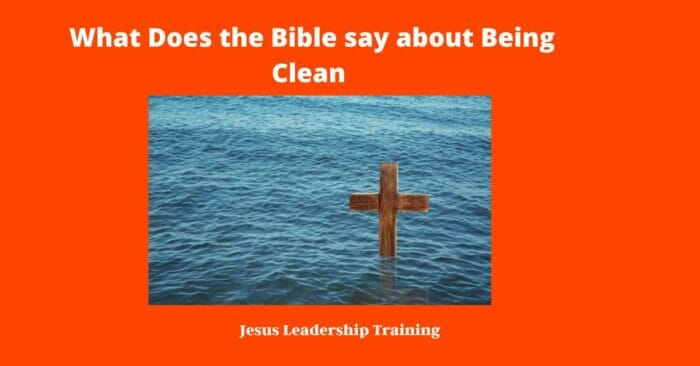– The Bible speaks of cleanliness in both physical and spiritual terms. In the Old Testament, cleanliness is seen as a way of life mandated by God, with instructions given in Leviticus and Deuteronomy on how to properly practice it.
The New Testament also speaks of cleanliness, with Jesus often expressing it in terms of purity. In the Bible, cleanliness is seen as an important part of being a faithful believer, with both physical and spiritual implications. Being clean is seen as being obedient to God’s commands, and it is also seen as a sign of holiness. The Bible also speaks of cleanliness as a form of respect for one’s self and others, as well as a way to bring glory to God.
Table of Contents
What Does the Bible say about Being Clean
We all have heard the common phrase “cleanliness is next to godliness”, but what does the Bible actually say about cleanliness? Cleanliness is a concept that has been discussed in many different religions and cultures throughout history, and the Bible is no exception.
In this blog, we will explore what the Bible says about cleanliness, including where and when in the Bible it mentions cleanliness, how the Bible defines cleanliness, cleanliness in the Old and New Testaments, purity laws in the Bible, cleanliness of the body and mind according to the Bible, Bible verses about cleanliness, what the Bible says about being dirty, keeping a clean home and clean thoughts according to the Bible, examples from Scripture, and what the Bible says about sanctifying cleanliness.

What Does the Bible Say About Cleanliness?
The Bible is full of stories, teachings, and instructions about cleanliness. The Bible encourages us to keep ourselves and our surroundings clean, both spiritually and physically. The Bible says that God is a God of order and cleanliness, and that He is pleased when we choose to live a life of cleanliness. In the book of Leviticus, it states: “You shall be holy, for I the Lord your God am holy” (Leviticus 19:2). This verse reminds us that we should strive to be holy, which includes having a clean and orderly life.

Where in the Bible Does it Mention Cleanliness?
The Bible mentions cleanliness in many different places. In the Old Testament, cleanliness is discussed in the book of Leviticus and the book of Numbers. In the New Testament, cleanliness is mentioned in the book of Matthew and the book of Mark. Other books of the Bible, such as the book of James, also mention cleanliness.
Physical Cleaning
- Hands: The Bible encourages people to keep their hands clean, as it is frequently used to work, pray, and interact with others. Leviticus 15:11 states, “Whenever a person has a discharge from his body, his discharge is unclean.” This is a reminder to wash our hands regularly.
- Body: Scripture also encourages people to keep their bodies clean. Proverbs 20:9 says, “Who can say, ‘I have made my heart clean; I am pure from my sin’?” This is a reminder to take care of our bodies and keep them clean.
- Clothing: The Bible also encourages us to keep our clothing clean. Proverbs 16:19 states, “Better to be lowly in spirit and among the oppressed than to share plunder with the proud.” This is a reminder to keep our clothing clean and free from dirt and stains.
- House: The Bible also encourages us to keep our houses clean. Proverbs 24:3-4 says, “By wisdom a house is built, and by understanding it is established; by knowledge the rooms are filled with all precious and pleasant riches.” This is a reminder to keep our houses clean and orderly.
- Heart: Additionally, the Bible encourages us to keep our hearts clean. Matthew 15:19 says, “For out of the heart come evil thoughts, murder, adultery, sexual immorality, theft, false testimony, slander.” This is a reminder to keep our hearts pure and free from sin.
Spiritual Things
- Clean Thoughts: The Bible encourages us to think clean thoughts and to guard our minds from impure or lewd images (Philippians 4:8). We are to be mindful of the words we speak and the thoughts we entertain, as these have the power to shape our lives (Proverbs 23:7).
- Clean Speech: The Bible encourages us to use our words to bless, edify, and build up (Ephesians 4:29). Our speech should be pure, free from gossip and slander, and should always reflect the holiness of God (Psalm 15:2-3).
- Clean Living: The Bible encourages us to live a life of purity and holiness (1 Thessalonians 4:7). We are to abstain from all forms of sexual immorality, and to keep our bodies pure and holy (1 Corinthians 6:18-20).
- Clean Hands: The Bible encourages us to be diligent in keeping our hands clean (Psalm 24:4). We are to avoid touching that which is unclean, and to keep our hands away from that which is impure (Proverbs 4:14-15).
- Clean Heart: The Bible encourages us to cultivate a heart that is pure and undefiled (Proverbs 4:23). We are to guard our hearts from all forms of impurity and wickedness (Psalm 119:9-11).
- Clean Conscience: The Bible encourages us to have a conscience that is clear and untainted by sin (Hebrews 10:22). We are to strive to walk in the Spirit, so that our thoughts and actions will be in line with God’s will (Romans 8:4-5).
When Does the Bible Speak About Cleanliness?
The Bible speaks about cleanliness throughout its pages. In the Old Testament, cleanliness is discussed in the book of Leviticus, which contains the laws of purity. In the New Testament, cleanliness is discussed in the book of Matthew and the book of Mark, which contain teachings from Jesus about cleanliness.
How Does the Bible Define Cleanliness?
The Bible defines cleanliness as a way of life that is pleasing to God. Cleanliness is a way of living that involves taking care of our bodies, our minds, and our surroundings according to God’s standards. Cleanliness is also about living with respect for God and for others.

Cleanliness in the Old Testament
The Old Testament contains many laws and instructions about cleanliness. In Leviticus, God gave instructions about how to maintain cleanliness and purity. He instructed the Israelites to wash their hands and feet, wash their clothes, and keep their homes and surroundings clean. He also outlined laws about food, hygiene, and sexual purity.
- Clean Hands: The Bible emphasizes the importance of having clean hands as it is seen as a show of reverence for God. In Psalm 24:4, it states, “He who has clean hands and a pure heart, who has not lifted up his soul to an idol or sworn deceitfully.” It is a reminder that having clean hands is not only a sign of outward purity, but also of inward purity.
- Clean Heart: In Psalm 51:10, the Bible states, “Create in me a clean heart, O God; and renew a right spirit within me.” This is a reminder to us that having a clean heart is essential to living a life that is pleasing to God. This includes not only outward acts of purity, but also inward attitudes and motivations.
- Clean Conscience: The Bible encourages us to live with a clean conscience. This means being aware of our actions and making sure that they are right in the eyes of God. In 1 Corinthians 10:31, it states, “So, whether you eat or drink, or whatever you do, do all to the glory of God.” This is a reminder to us that we should take care to be sure that our actions are pleasing to the Lord.
- Clean Language: The Bible encourages us to use clean language. This means avoiding words that are coarse, vulgar, and profane. In Ephesians 4:29, it states, “Let no corrupting talk come out of your mouths, but only such as is good for building up, as fits the occasion, that it may give grace to those who hear.” This is a reminder to us to not only be aware of what we say, but also how we say it.
- Clean Living: The Bible encourages us to live a clean life. This means avoiding any kind of immoral behavior, such as sexual immorality, dishonesty, and greed. In 1 Corinthians 6:18, it states, “Flee from sexual immorality. Every other sin a person commits is outside the body, but the sexually immoral person sins against his own body.” This is a reminder to us to be mindful of our actions and the choices we make.
Cleanliness in the New Testament
The New Testament also speaks about cleanliness. In the book of Matthew, Jesus taught that it is not only important to be clean on the outside, but also on the inside. He said “Blessed are the pure in heart, for they shall see God” (Matthew 5:8). This verse shows us that it is important to be clean inside and out in order to please God.
- Washing the Feet: Jesus taught the importance of cleanliness in one of the most memorable and powerful passages of the New Testament. He showed his disciples the importance of washing one another’s feet, as a symbol of humility and servitude. It is a reminder to us all that cleanliness not only shows respect, but is also a sign of faith.
- Clean Clothes: Another example of the New Testament’s emphasis on cleanliness is found in the parable of the wedding feast. In this parable, the king provides those who were invited with clean, white robes, emphasizing the importance of cleanliness and purity.
- Washing Hands: Jesus also taught his disciples to wash their hands before eating, as a way of avoiding uncleanliness and illness. This is another reminder that cleanliness is a sign of faith and respect.
- Clean Heart: The New Testament also emphasizes the importance of having a clean heart. Jesus said that if someone wants to be clean on the outside, they must first be clean on the inside. This is a reminder to us all that our spiritual lives should be just as important as maintaining physical cleanliness.
- Cleanliness of the Temple: In the New Testament, Jesus was very vocal in his disapproval of the way the Temple was kept clean. He expressed his anger that the Temple had become a “den of thieves” and emphasized the importance of keeping the Temple clean and holy.
- Cleanliness and Health: The New Testament also encourages us to maintain good hygiene in order to stay healthy. This is especially important in the context of the time when diseases like leprosy were common.
- Bathing: The New Testament also emphasizes the importance of bathing. Jesus and his disciples often washed their feet, hands and face each day as a way of staying clean. This is a reminder to us all that even the smallest acts of cleanliness can make a difference.
Purity Laws in the Bible
The Bible contains purity laws that are still relevant today. These laws outline instructions for keeping ourselves and our surroundings clean and free from contamination. For example, in Leviticus, God instructed the Israelites to not eat unclean animals and to not touch anything unclean. These instructions were given to keep the Israelites from becoming contaminated and to keep them healthy.
- No Unlawful Intercourse: This law prohibits any type of sexual relations between persons who are not married to each other. This includes adultery, premarital sex, and incest. (Leviticus 18:6-23)
- Separation During Menstruation: This law requires that a woman must remain outside of the home for seven days during her menstrual cycle. (Leviticus 15:19-30)
- No Eating Blood: This law prohibits the ingestion of blood, either directly or indirectly. (Leviticus 7:26-27 and Leviticus 17:10-14)
- No Eating Unclean Animals: This law prohibits the consumption of certain animals, such as pigs, rabbits, and shellfish. (Leviticus 11:1-47)
- No Incest: This law prohibits any type of sexual relations between close relatives. (Leviticus 18:6-17)
- No Bestiality: This law prohibits any type of sexual relations between a person and an animal. (Leviticus 18:23)
- No Prostitution: This law prohibits engaging in sexual acts in exchange for money or other benefits. (Deuteronomy 23:17-18)
- No Adultery: This law prohibits any type of sexual relations between a married person and someone who is not their spouse. (Exodus 20:14)
- No Homosexual Relations: This law prohibits any type of sexual relations between two persons of the same sex. (Leviticus 18:22)
- No Marriage Between Believers and Unbelievers: This law prohibits any type of marriage between a believer and an unbeliever. (2 Corinthians 6:14-15)

Cleanliness of the Body According to the Bible
The Bible encourages us to maintain cleanliness of the body. In Leviticus, God instructed the Israelites to wash their hands and feet before entering the temple. This was to keep the temple clean and to prevent contamination. In the New Testament, Jesus taught that it is important to keep our hearts clean and pure. He said “Blessed are the pure in heart, for they shall see God” (Matthew 5:8).
Cleanliness of the Mind According to the Bible
The Bible also encourages us to maintain cleanliness of the mind. In Proverbs, it says “Keep your heart with all diligence, for out of it spring the issues of life” (Proverbs 4:23). This verse encourages us to keep our thoughts and attitudes pure and clean. In the New Testament, Jesus taught that it is important to guard our thoughts and to not allow our minds to be filled with impure thoughts.
Cleanliness According to the King James Version
The King James Version of the Bible has some helpful verses about cleanliness. In Leviticus, it says “You shall be holy, for I the Lord your God am holy” (Leviticus 19:2). This verse reminds us that we should strive to be holy and to live a life of cleanliness. In the New Testament, it says “Blessed are the pure in heart, for they shall see God” (Matthew 5:8). This verse encourages us to keep our hearts and minds clean in order to please God.
Bible Verses About Cleanliness
There are many Bible verses that discuss cleanliness. Here are a few examples:
- • “You shall be holy, for I the Lord your God am holy” (Leviticus 19:2).
- • “Blessed are the pure in heart, for they shall see God” (Matthew 5:8).
- • “Create in me a clean heart, O God” (Psalm 51:10).
- • “A man who has clean hands and a pure heart, who does not lift up his soul to an idol or swear by what is false” (Psalm 24:4).
- • “Wash yourselves; make yourselves clean; remove the evil of your deeds from before my eyes; cease to do evil” (Isaiah 1:16).
What Does the Bible Say About Being Dirty?
The Bible speaks negatively about being dirty. In Leviticus, it says “Do not defile yourselves by any of these things, for by all these the nations I am driving out before you have become defiled” (Leviticus 18:24). This verse reminds us that being dirty is a sin and that we should strive to remain clean.
Keeping a Clean Home According to the Bible
The Bible encourages us to keep our homes clean. In Proverbs, it says “Cleanse your hands, you sinners, and purify your hearts, you double-minded” (Proverbs 4:23). This verse tells us that it is important to keep our homes and our hearts clean. In the book of Deuteronomy, God instructs us to “Take heed to yourself that you do not offer your burnt offerings in every place that you see” (Deuteronomy 12:13). This verse encourages us to keep our homes and our lives holy and free from contamination.
Keeping Clean Thoughts According to the Bible
The Bible encourages us to keep our thoughts clean. In the book of Philippians, it says “Finally, brothers, whatever is true, whatever is honorable, whatever is just, whatever is pure, whatever is lovely, whatever is commendable, if there is any excellence, if there is anything worthy of praise, think about these things” (Philippians 4:8). This verse reminds us to think about only pure and honorable things.
Cleanliness in the Bible: Examples from Scripture
There are many examples of cleanliness in the Bible. In the book of Numbers, God instructed the Israelites to wash their clothes and to keep their camp clean. This was to prevent contamination and to keep the people healthy. In the New Testament, Jesus taught about the importance of washing hands before eating and about keeping our hearts and minds clean.
What Does the Bible Say About Sanctifying Cleanliness?
The Bible speaks about sanctifying cleanliness. In the book of Exodus, God instructed the Israelites to keep their camp clean and to not touch anything unclean. He also said that they should not defile God’s holy name by doing anything impure. This shows us that God desires us to keep ourselves and our surroundings clean and holy.
How to Develop Cleanliness in Ourselves According to the Bible
The Bible encourages us to develop cleanliness in ourselves. In the book of Proverbs, it says “Cleanse your hands, you sinners, and purify your hearts, you double-minded” (Proverbs 4:23). This verse reminds us to keep our hands and our hearts clean in order to please God. In the New Testament, Jesus taught that we should strive to be clean inside and out. He said “Blessed are the pure in heart, for they shall see God” (Matthew 5:8).
Final Thoughts – What Does the Bible Say about Being Clean
The Bible speaks about cleanliness in many places. It encourages us to maintain cleanliness of the body, mind, and surroundings in order to please God. The Bible outlines laws and instructions about cleanliness in both the Old and New Testaments. It also mentions purity laws that are still relevant today. Bible verses about cleanliness remind us to keep our thoughts, attitudes, and hearts clean in order to be pleasing to God. Finally, the Bible teaches us that we should strive to develop cleanliness in ourselves in order to sanctify our lives.



